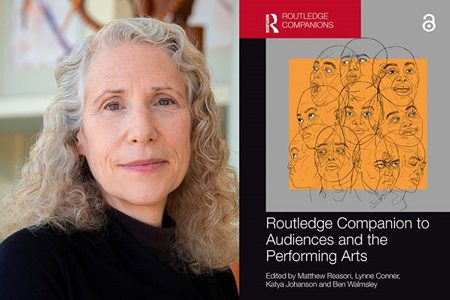Theatre professor’s co-edited work examines audience-performer relationship

Lynne Conner, professor and chair of the Department of Theatre, is one of four editors of the new “Routledge Companion to Audiences and the Performing Arts,” a thorough and multifaceted exploration of audiences and the audience experience and their relationship to the performing arts and performance experience.
Comprised of more than 50 articles and essays from nearly 60 contributors, the book is a groundbreaking body of research that establishes the central role of the audience to the performing arts and the many ways to consider, investigate, support, and evaluate that role.
The book is organized into four sections, with each of the editors – Matthew Reason, Katya Johanson, and Ben Walmsley, in addition to Conner – overseeing a section. As lead editor for “Part One: Histories, Theories and Questions of Social Justice,” Conner wrote the introduction, interviewed the author Ellen Dissanayake, and wrote the third chapter, “Disrupting the Audience as Monolith.”
“All seven chapters included in the ‘Histories, Theories and Questions of Social Justice’ section are focused, in one way or another, on the need for greater awareness over matters of power, equity and inclusion in audience research practices,” Conner wrote in a recent blog post. “The authors in Part One argue for the unsettling of the field’s established patterns, habits and assumptions that are, upon reflection, informed by systemic racism, sexism and ableism (overt and subtle) by positing important questions about our methodological and narrative assumptions as audience researchers.”
The other sections, contributed by a collection of international writers and researchers in disciplines as diverse as psychology, sociology, neuroscience, the performing arts and arts marketing, examine audience policies, politics and practices; the varied methods and methodologies of audience research; and an eclectic list of elements of the audience/performance dynamic — topics like laughter, memory and the effects of Covid-19.
For arts practitioners and administrators, the “’Routledge Companion’ shows the richness and potential of broadening our thinking about audiences whose purpose is primarily to provide money and support for art-making to understanding — really understanding — the experience audiences have,” wrote Hannah Grannemann in an introduction to the book in her blog, “Row X.”